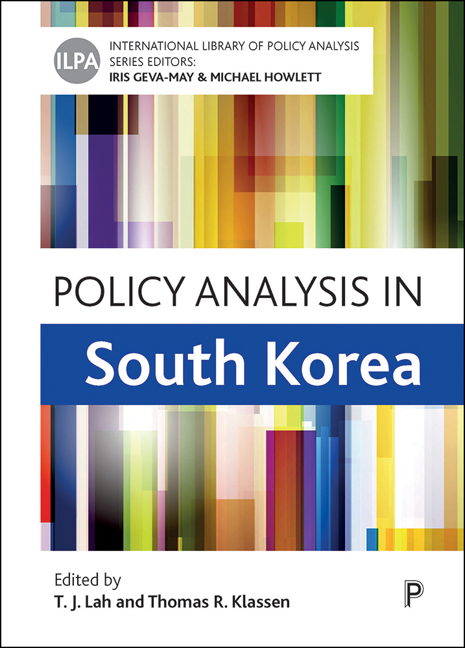Book contents
- Frontmatter
- Dedication
- Contents
- List of figures, tables and boxes
- List of abbreviations
- Notes on contributors
- Acknowledgements
- Editors’ introduction to the series
- Foreword
- Part One Overview of policy analysis in Korea
- Part Two Policy analysis by governments
- Part Three Committees, consultants, media, public inquiries and public opinion
- Part Four Parties, interest groups and advocacy-based policy analysis
- Part Five Academia, research institutes and policy analysis
- Index
seven - Policy analysis in Korean local governments
Published online by Cambridge University Press: 18 January 2024
- Frontmatter
- Dedication
- Contents
- List of figures, tables and boxes
- List of abbreviations
- Notes on contributors
- Acknowledgements
- Editors’ introduction to the series
- Foreword
- Part One Overview of policy analysis in Korea
- Part Two Policy analysis by governments
- Part Three Committees, consultants, media, public inquiries and public opinion
- Part Four Parties, interest groups and advocacy-based policy analysis
- Part Five Academia, research institutes and policy analysis
- Index
Summary
Introduction
The starting point for official and mandatory policy analysis conducted by local governments in Korea can be found in the ‘Local Financial Investment Project Review System’ introduced in 1992 under the Local Finance Act. Under this statute, Korean local governments are required to examine the necessity of the project and the feasibility of the project plan when setting the budget for largescale financial investment projects (Ministry of the Interior and Security, 2017). From this point onward, most local governments in Korea have conducted some kind of policy analysis to determine whether or not to provide financial support for projects.
However, it is necessary to first briefly explain the background to the introduction of the local government system in order to explain policy analysis in Korean local governments. The Korean government began electing local government heads and introduced the local autonomy system in July 1995 (Hong, 2005). Unfortunately, because of the tradition of top-down and uniform policy decisions by the central government prior to the introduction of the local autonomy system, policy analysis was rarely conducted by local governments. Local governments simply played the role of carrying out policies that had already been built by the central government. Although this is still the case today, the introduction of the local autonomy system served as an important turning point for the gradual expansion of local government policy analysis.
As the problems caused by Korea's rapid urbanisation and hollowing out of rural areas have come to the fore, social problems are now occurring across many sectors of society in education, housing, welfare, the environment, and law and order. Accordingly, Korean local governments are developing policies to resolve these problems either in partnership with or independently from the central government. However, as local governments tried to solve these policy problems with limited staff and funding, it became necessary to employ policy analysis to pursue efficient policy execution, feasibility studies and performance-oriented measures. As a result, policy analysis that considers the whole policy planning and execution process has been carried out in many local governments (Kim, 2010). Because all policies require a budget, a feasibility study is required under the Local Finance Act unless the project is legally designated as exempt from a financial investment review or is a non-investment project that costs less than the minimum required for a fiscal investment review.
- Type
- Chapter
- Information
- Policy Analysis in South Korea , pp. 86 - 98Publisher: Bristol University PressPrint publication year: 2023



